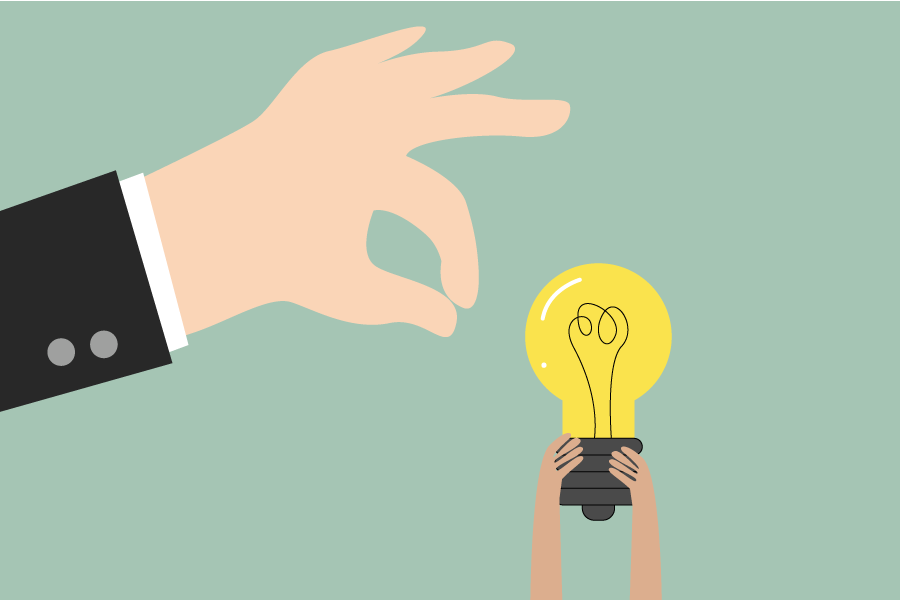
Universities prevent researchers from taking complete ownership of ideas
From the modern-day elevator to social media worlds like Facebook, America prides itself on promoting innovation and invention. However, coming up with a new and useful idea can be extremely expensive, difficult and time-consuming. For this reason, many Ph.D. candidates and professors dream of working at prestigious research universities that will provide researchers with the resources they need, such as money and technology, to pursue their inventions and ideas.
“A lot of professors who have had successful pasts will be able to get a job at a university like this, use its facility, develop their [studies] and get grants to their department or school and also to himself or herself,” said Ryan Ko, fourth-year biochemistry and molecular biology major. “There are professors in the field that are motivated to keep getting ahead and find that big breakthrough.”
Since his sophomore year, Ko has worked in a lab studying structural biology of proteins — even conducting his own independent research project — and has seen many cases of the interaction between industry and research.
“A professor who has had that big breakthrough and starts selling [a discovery] to industry needs to consider the fact that it is intellectual property of the university and you can’t make additional money off of their facilities,” Ko said. “The school’s opinion is that if you develop an idea, it becomes the school property if you use their laboratory or their process of hiring undergraduates or graduates […] you’re using the school as a way to get to where you are.”
In a recent lawsuit over the ownership of a strawberry breed invented at UC Davis, two former UC Davis scientists were found guilty of breeding what was considered to be the university’s intellectual property. This is where the catch of the university research system comes in.
According to a Forbes technology article from 2012, all UC campuses require that graduate students who have been hired to perform research each sign a contract that acknowledges their obligation to fully disclose potentially patentable inventions to the university-authorized licensing office. This holds true in the case of professors as well (as seen in the strawberry suit) because the majority of creations, inventions and discoveries made at the university belong to the university. Researchers may be receiving ample funding and capital for their projects, but are they really their projects?
For political science graduate student Matt Lesenyie, this system does not deter his creativity nor his drive to conduct research. Actually, Lesenyie feels he is able to do his research specifically because of the university’s support.
“I do research using lab experiments and samples of students that examines differences in campaign finance disclosure in advertisements,” Lesenyie said. “It’s been about four years of research using lab equipment and convenience samples that I couldn’t do it without the resources that we have here[…]I simply don’t have that many people and computers.”
If this is the case for Lesenyie, how is it that some faculty find themselves going against the university in an effort to exploit what they deem is their rightful intellectual property?
Intellectual property refers to the creations of the mind from physical inventions to ideas, which is how faculty might become stuck in the grey area of who has rightful ownership. According to the economic principle of rivalry, ideas — whether they be for a pest-resistant strawberry or new iPhone app — are non-rivalrous, meaning that one person’s use of an idea does not prevent another person’s use of that same idea. Professors may fall into the trap of believing that their ideas belong to them and only them, when in fact the university must take ownership of this idea in order to prevent it from exploitation.
“When you sign your contract, it says whatever you bought with research funds at Davis stays [at the university], but when you come up with an idea it’s much more difficult because the idea is out there now for everyone to use,” said economics professor Athanasios Geromichalos. “You can see that both sides have a point. In the one hand it was [the professor] and his hard work that helped make the idea come true, at the same time [his idea] not only physically took place inside UC Davis facility but it also took place with the financial and research support from UC Davis.”
Geromichalos studies modern monetary policy and how the central bank affects aggregate microeconomic activity, a topic that he hopes would eventually be relevant for monetary policy. Even though Geromichalos will probably not find himself in a situation akin to that of the strawberry lawsuit, he stresses that it is important for faculty to stay humble and remember the sources of their success.
“I think the university helps you conduct research under excellent conditions,” Geromichalos said. “You want the university to help you come up with good ideas but you don’t want to forget that the university had a role to play in this contribution.”
Despite his confidence in not having to face a challenge of ownership against the university, Geromichalos believes that the university could do more to educate its professors and graduate students on the subject of intellectual property.
When researchers know that ideas they worked so hard for will be taken away from them, this creates disincentives for people to be innovative and work hard, according to Geromichalos. As a result, he argues for more of a middle-ground solution for deciding who has rights to intellectual property.
“We need to maximize efficiency by having a mechanism in play that makes sure there is no loss of good ideas because of disincentives,” Geromichalos said. “But, at the same time, there should be a fair split of the fruits of discoveries between the university and the researcher. Having a more clear framework and understanding of what happens in cases like that can definitely not hurt.”
Written by: Gillian Allen — features@theaggie.org



